

Psychiatric Service Dog Society. SEL for Parents and Families. Source: Illinois State Board of Education (Download the FAQ fact sheet PDF here) Social Emotional Living. EQ Through Art - Children Learn to Express Emotions. Emotional Literacy : Help Your Child Develop Their Emotional Vocabulary. A Guide to Help Children Express their Feelings Children go through a lot of ups and downs.
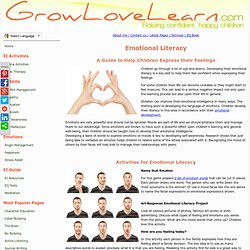
Developing their emotional literacy is a key skill to help them feel confident when expressing their feelings. For some children their life can become unstable or they might start to feel insecure. This can lead to a serious negative impact not only upon the learning process but also upon their life in general. Children can improve their emotional intelligence in many ways. Emotions are very powerful and should not be ignored. Activities for Emotional Literacy Name that Emotion For this game prepare a list of emotion words that can be cut in pieces. Art Response Emotional Literacy Project. Emotional Intelligence Test. For decades, a lot of emphasis has been put on certain aspects of intelligence such as logical reasoning, math skills, spatial skills, understanding analogies, verbal skills etc.

Researchers were puzzled by the fact that while IQ could predict to a significant degree academic performance and, to some degree, professional and personal success, there was something missing in the equation. Some of those with fabulous IQ scores were doing poorly in life; one could say that they were wasting their potential by thinking, behaving and communicating in a way that hindered their chances to succeed. One of the major missing parts in the success equation is emotional intelligence, a concept made popular by the groundbreaking book by Daniel Goleman, which is based on years of research by numerous scientists such as Peter Salovey, John Meyer, Howard Gardner, Robert Sternberg and Jack Block, just to name a few. Read every statement carefully and indicate which option applies best to you. Emotional Intelligence Resources : EQ Games and Activities. SEL & Academics. There is a growing awareness in the U.S. among educators and policymakers about the importance of social and emotional development for successful student performance in preschool and elementary school.
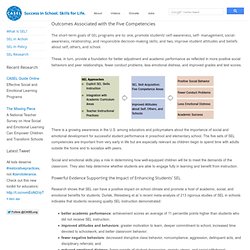
The five sets of SEL competencies are important from very early in life but are especially relevant as children begin to spend time with adults outside the home and to socialize with peers. Social and emotional skills play a role in determining how well-equipped children will be to meet the demands of the classroom. Snapshots of your child’s social and emotional well-being: K-3. Mid-continent Research for Education and Learning, Content Knowledge Standards and Benchmark Database. CSEFEL: Center on the Social and Emotional Foundations for Early Learning. Skills & Competencies. CASEL has identified five interrelated sets of cognitive, affective and behavioral competencies.
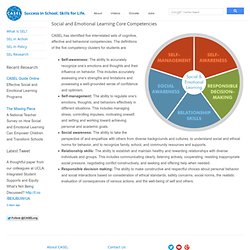
Study Grapples With How to Assess Social-Emotional Skills. This is the second of two posts exploring new research presented at the bi-annual meeting of the Society for Research in Child Development.
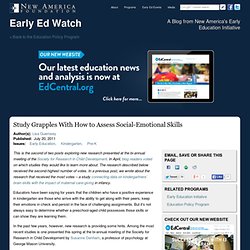
In April, blog readers voted on which studies they would like to learn more about. The research described below received the second-highest number of votes. In a previous post, we wrote about the research that received the most votes – a study connecting data on kindergartners’ brain skills with the impact of maternal care-giving in infancy. Educators have been saying for years that the children who have a positive experience in kindergarten are those who arrive with the ability to get along with their peers, keep their emotions in check and persist in the face of challenging assignments. But it’s not always easy to determine whether a preschool-aged child possesses those skills or can show they are learning them. In the past few years, however, new research is providing some hints.
Teaching Tomorrow's Skills to Today's Students. Published Online: July 5, 2011 By Heather Wolpert-Gawron "Why do we have to do this?

" Many teachers have been hearing this question more frequently in recent years. Students detect a deepening divide between "real life" and "school life," and they have a point. As teachers, we should commit ourselves to linking instruction directly to the skills students will need in higher education and the workplace. America's Children: Key National Indicators of Well-Being, 2011 - Introduction. Nineteen years ago, the Office of Management and Budget (OMB) joined with six other Federal agencies to create the Federal Interagency Forum on Child and Family Statistics.
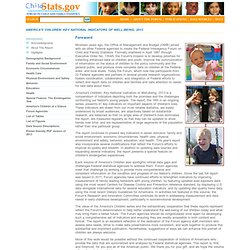
Formally chartered in April 1997 through Executive Order No. 13045, the Forum's mission is to develop priorities for collecting enhanced data on children and youth, improve the communication of information on the status of children to the policy community and the general public, and produce more complete data on children at the Federal, state, and local levels. Today the Forum, which now has participants from 22 Federal agencies and partners in several private research organizations, fosters coordination, collaboration, and integration of Federal efforts to collect and report data on children and families and calls attention to needs for new data about them.
Each volume of America's Children also spotlights critical data gaps and challenges Federal statistical agencies to address them. Katherine K. Initiatives, SEL Resources. Lincoln-Titus ES. Publications. Free Social and Emotional Development Activities, Free Social Emotional Lesson Plans & Goals, SEL - Wings for Kids. Download our free Ready, Set, Soar with SEL—a DIY Social Emotional Learning Kit to help model, shape and reinforce social skills. Does your child need to learn how to handle stress?
Could they use help expressing emotions constructively? The Ready, Set, Soar with SEL kit was specially designed for parents/guardians, educators, youth development leaders and others who want to incorporate social & emotional development activities, lessons and plans into kids' daily lives. All activities are based on proven activities from our "WINGS for kids" after school program. Credits. Arthur . Parents & Teachers . Social & Emotional Development. Teachers Resource Room. Emotionally Literate Schools. Sample SEL Activities. School Social Work/Guidance/Psychology Booklist.
School Social Work, Guidance & Psychology Anger and Aggression in Students Assessment, Intervention & Counselling Guidance Resources.
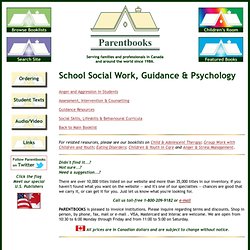
Counseling Corner. Monday, April 14th - Day 3 Posted on: April 14, 2014 Good morning, it is Monday, April 14th.

It is a day 3. Students: Tomorrow will be Day 1 of MCA testing, and you will be completing sections one and two of the MCA Reading Test. When the bell rings to dismiss you from KORT you will report to your testing location with at least 2 number two pencils (non-mechanical), Non-Language Arts Homework, and a book to read for when you have finished tomorrow’s required testing. 5t hand 6th graders- your activity night has been rescheduled for April 25thfrom 6-8:30 at Middle School East. Students interested in summer driver’s education classes should stop in the office and pick up a registration flyer. Links to Social Emotional Resources : Aptakisic Junior High School Social Work Blog. The websites below are just some of the many resources out there for parents.
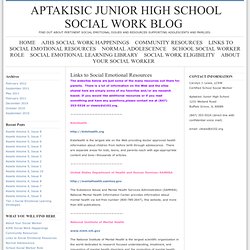
There is a lot of information on the Web and the sites shared here are simply some of my favorites and/or are research based. If you would like additional resources or if you read something and have any questions,please contact me at (847) 353-5526 or clewis@d102.org. KidsHealth KidsHealth is the largest site on the Web providing doctor approved health information about children from before birth through adolescence. Want Creative Workers? Loosen the Reins, Boss.
Guidelines for Best Practice. These guidelines are based on an exhaustive review of the research literature in training and development, counseling and psychotherapy, and behavior change. The guidelines are additive and synergistic; to be effective, social and emotional learning experiences need not adhere to all of these guidelines, but the chances for success increase with each one that is followed. The guidelines are divided into four phases that correspond to the four phases of the development process: preparation, training, transfer and maintenance, and evaluation. Each phase is important. These guidelines were developed for the Consortium by Cary Cherniss and Daniel Goleman, with the assistance of Kim Cowan, Robert Emmerling, and Mitchel Adler. If you are interested in the full technical report that includes all the supporting research for each guideline, you can view the full technical report online or download the full technical report from this site. Emotional Intelligence: What it is and Why it Matters.
Ever since the publication of Daniel Goleman’s first book on the topic in 1995, emotional intelligence has become one of the hottest buzzwords in corporate America. For instance, when the Harvard Business Review published an article on the topic two years ago, it attracted a higher percentage of readers than any other article published in that periodical in the last 40 years. When the CEO of Johnson & Johnson read that article, he was so impressed that he had copies sent out to the 400 top executives in the company worldwide. Emotional Intelligence Consortium - Chapter and Article Reprints.
Click on the links below to view the full-text of the following book chapters. Chapters can be viewed in HTML and, in most cases, a PDF file is also available for download. All the following book chapters have been posted here with the permission of the publishers and authors. Book Chapters Boyatzis, R.E. (2005). Core competencies in coaching others to overcome dysfunctional behavior. In this chapter, Richard Boyatzis discusses issues related to coaching others to be more effective. Strategy of the Week: Character Education. Description Former U.S. Secretary of Education Rod Paige once said, "We have to remind our students of a lesson taught in Ancient Greece: the character of the person is the primary product of education.
Self-Esteem. Developing Social Skills and Relationships. Learning to successfully interact with others is one of the most important aspects of a child’s development, with far-reaching implications. Social & Emotional Challenges. PDP - Empathy. PDP - Social-Emotional Development throughout the Developmental Stages.